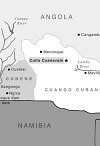Africa
Accumulation by Agricultural Dispossession
Land grabs—whether initiated by multinational corporations and private investment firms emanating from the capitalist core, sovereign wealth funds in the Middle East, or state entities such as China and India—are now in the news constantly. For example, in July 2013 the Colombian ambassador to the United States resigned over his participation in a legally questionable effort to help the U.S. corporation Cargill use shell companies to amass 130,000 acres of land. This land was supposed to be used for agricultural production, but there is also land being grabbed for other purposes—such as mining or to construct roads, buildings, and dams. In human terms, land grabs mean real people and families are dispossessed. When people lose access to their land, they also lose their means to obtain food, their communities, and their cultures. | more…

In Angola in the spring of 1988 the armed forces of apartheid South Africa and the US-backed mercenaries of Jonas Savimbi were defeated by the combined force of the Cuban military, the Angolan army, and the military units of the liberation movements of South Africa and Namibia. This led directly to the independence of Namibia and then to the fall of the apartheid regime in South Africa itself. Cuba’s heroic role is the outstanding example of principled anti-imperialist internationalism in the last decades of the twentieth century.… We celebrate the twenty-fifth anniversary of these events by reprinting the account by Horace Campbell that appeared in Monthly Review in April 1989, with some pride at having published so sharp an analysis of current events—events largely ignored by the mass media then and since. We then present a military-focused historical analysis by Monthly Review Press author Ronnie Kasrils, who had the extraordinary fate to have headed ANC military intelligence in the battle alongside the Cubans, and then to have served for five years as Deputy Minister of Defense in the post-apartheid South African government—in regular contact with officers who had commanded the opposing forces. —The Editors
25th Anniversary of a Historic African Battle
Prohibited from meeting openly by South Africa’s apartheid government, the Seventh Congress of the South African Communist Party was held in Cuba in April 1989. When Jorge Risquet, one of Fidel Castro’s shrewdest and most trusted colleagues, addressed the gathered members, he was greeted with the resounding salutation “Viva Cuito Cuanavale!” For the South African delegates, many who had come from military duty in Angola itself where the African National Congress (ANC) had military training facilities courtesy of the government, there was no doubt whatsoever that an epic victory had been recently won at the remote town of Cuito Cuanavale in Angola. The loser was the apartheid military machine in that embattled country in March 1988, constituting a historic turning point in the struggle for the total liberation of the region from racist rule and aggression. | more…
Maximilian Forte, Slouching Towards Sirte (Montreal: Baraka Books, 2012), 341 pages, $27.95, paperback.
Perhaps no war in recent memory has so thoroughly flummoxed the Euro-Atlantic left as the recent NATO war on Libya. Presaging what would occur as U.S. proxies carried out an assault on Syria, both a pro-war left and an anti-anti-war left [gave] endless explanations and tortuous justifications for why a small invasion, perhaps just a “no-fly-zone,” would be okay—so long as it didn’t grow into a larger intervention. They cracked open the door to imperialism, with the understanding that it would be watched very carefully so as to make sure that no more of it would be allowed in than was necessary to carry out its mission. The absurdity of this posture became clear when NATO immediately expanded its mandate and bombed much of Libya to smithereens, with the help of on-the-ground militia, embraced as revolutionaries by those who should have known better—and according to Maximilian Forte, could have known better, had they only looked. | more…
The name “Walter Rodney” has receded from public memory in the last few decades. Only yesterday, it seems to this reviewer, Rodney was the most promising young political scholar of Afro-Caribbean origin, influential from parts of Africa to Britain and North America, not to mention his home Guyana, as well as Jamaica, Trinidad, and other anglophone islands. He was revered: great things were expected of him, as great things were expected of the new phase of regional history in which independence had been achieved and masses mobilized for real change. | more…
Is Population the Problem?
Within the current system, there are steps that can and should be taken to lessen the environmental problems associated with the limits of growth: the depletion of resource taps and the overflowing of waste sinks, both of which threaten the future of humanity.… [H]owever, …attempts to trace these problems, and particularly the problem of depletion natural resources, to population growth are generally misdirected. The economic causes of depletion are the issues that must be vigorously addressed (though population growth remains a secondary factor). The starting point for any meaningful attempt actually to solve these problems must begin with the mode of production and its unending quest for ever-higher amounts of capital accumulation regardless of social and environmental costs—with the negative results that a portion of society becomes fabulously rich while others remain poor and the environment is degraded at a planetary level. | more…
In February 1967 came the Arusha Declaration. The ruling party, the Tanganyika African National Union (TANU), issued the Arusha Declaration and a policy of socialism and self-reliance. Our word in Kiswahili, Ujamaa (translated as extended family or familyhood), became the official policy. A number of companies in the commanding heights of the national economy were nationalized by the government. That started a whole new debate at the university. Walter Rodney had just come from SOAS (the School of Oriental and African Studies, University of London) and became a young lecturer here. In the conference on rethinking the role of the university in now socialist Tanzania, he played a very important role. | more…
Hein Marais, South Africa Pushed to the Limit: The Political Economy of Change (London / New York: Zed Books, 2011), 566 pages, $45, paperback.
Elsewhere we have written that the breakup of Yugoslavia “may have been the most misrepresented series of major events over the past twenty years.” But the far bloodier and more destructive invasions, insurgencies, and civil wars that have ravaged several countries in the Great Lakes region of Central Africa over the same years may have been subjected to even greater misrepresentation. To a remarkable degree, all major sectors of the Western establishment swallowed a propaganda line on Rwanda that turned perpetrator and victim upside-down. | more…
The Italian communist philosopher Antonio Gramsci makes, in his Prison Notebooks, the following insightful remarks regarding the character of critical work and reflection. He states: “The beginning of a critical elaboration is the consciousness of that which really is, that is to say a ‘knowing of yourself’ as a product of the process of history that has unfolded thus far and has left in you, yourself, an infinity of traces collected without the benefit of an inventory. It is necessary initially to make such an inventory.” In what follows I will undertake such a task. | more…
Likened to a sudden tsunami, reports of declining staple food availability and the possibility of a world food crisis first appeared in the international press in late 2007.1 Sub-Saharan Africa, with its deepening need for disaster food relief in arid and war-torn areas, was most vulnerable. The economic viability of western donors’ food aid to the continent was increasingly being stretched. As food riots flared in various Asian and Latin American cities, urban food riots also began surfacing in Africa, alongside the perennial threat of rural famine. | more…

This book, the first extended biography of Ruth First and Joe Slovo, is a remarkable account of one couple and the revolutionary moment in which they lived. Alan Wieder’s heavily researched work draws on the usual primary and secondary sources but also an extensive oral history that he has collected over many years. By intertwining the documentary record with personal interviews, Wieder portrays the complexities and contradictions of this extraordinary couple and their efforts to navigate a time of great tension, upheaval, and revolutionary hope. | more…

